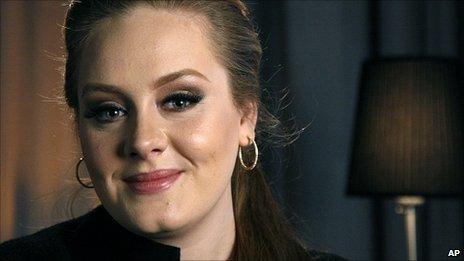How has Adele become so successful?
- Published

Adele's second album, 21, has spent nine consecutive weeks at number one in the UK album chart - equalling Madonna's record as the longest for a female solo artist. How has she become so successful?
Adele first came into the spotlight as the ДѓЯѓДЋУН's Sound of 2008 winner. Aged just 19, she was the youngest act to be ever given the accolade from key music critics, broadcasters and bloggers.
Her debut album, also titled 19, has sold 1.1 million copies to date in the 106 weeks it has been in the chart and a resurgence in its popularity has seen the singer occupy the number one and two spots in the rundown for three of the past five weeks.
In 2009, with the record certified four times Platinum in the UK and Gold in the US, she went on to win two Grammys for best new artist and best female pop vocal performance for hit single Chasing Pavements.
21 has so far sold 1.5 million copies in the UK
The singer's second album 21, has so far sold 1.5 million copies in its nine weeks of release and spawned hits Rolling in the Deep and current number one song, Someone Like You.
The X Factor 'factor'
And upon the release of the second single, Adele became the first living artist since the Beatles to have two top five hits in the UK single and album charts simultaneously.
She now joins the club whose only other members are Dido and Leona Lewis, as British female solo artists to have had a number one album for at least six consecutive weeks.
The Official Charts Company's Phil Matcham says the singer's success is partly due to a matter of timing and a little help from a certain ITV talent show.
"19 was such a successful album and [her Bob Dylan cover] Make You Feel My Love constantly seemed to be used on the X Factor so the record kept coming back into the charts," he says.
Music Week's Paul Williams agrees the show helped give the singer constant exposure between albums as well as introducing her to a new audience.
"A lot of the very mainstream audience might not have come across Adele before and then downloaded her version of the song," he says.
"The timing worked out quite well for her and her record company as a few months after there's a brand new album."
After her third week at number one with 21, Adele performed Someone Like You with just a piano at the Brit Awards, which propelled the single straight to the top of the chart.
"It got down to the core of the music," says Williams. "You're used to very choreographed performances at the Brits and just to strip it back to the bare basics was a brave thing to do."
Changing market
Matcham says her Brits performance undoubtedly helped sales: "The album had already been number one for a couple of weeks, but sales started to drop.
"Then she did the Brits and suddenly sales shot up. Then she performed on Comic Relief and it took Someone Like You back up the chart again.
"But if it wasn't for the fact she had a couple of great tracks it wouldn't have pushed the album up."
Matcham says however, that there tend to be fewer big album releases during the early part of the year, which has worked in Adele's favour in securing the top spot for so long.
Adele's performance at the Brit Awards was heavily watched on YouTube
Williams adds the album market has also changed in recent years: "Albums don't sell as many as they used to so to get to number one you don't need to sell nearly as many.
"But Adele's sales numbers compared to any time in the past is still remarkable - no album has ever in the first three months of the year managed to sell one million copies and this has now done 1.5 million.
Timing and clever promotion aside, William says Adele's appeal is the connection she makes with the audience.
"People see her as a real talent and artist," he says.
"At a time when, too often, very manufactured artists are being pushed at the public, it feels like a breath of fresh air."
Matcham says there is no reason why Adele cannot stay at number one in the album chart for a while: "Sales have consistently been very high.
"It's going to be a case of someone knocking her off number one rather than her sales dropping and someone overtaking her - so if there's an established artist that brings out a new record they could overtake her.
"But if not number one, she's going to be in the top three or top five for weeks to come."
- Published28 March 2011
- Published6 March 2011
- Published3 March 2011